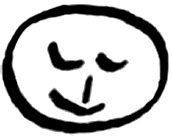Let us now consider a very instructive case of that use of the word
“particular”
in which it does not point to a
comparison || in which it doesn't indicate that
I'm making a comparison, and yet seems most
strongly to do so, – – the case when we contemplate the expression of
a face primitively drawn in this way:

.
Let this face produce an impression on you.
You may then feel inclined to say: “Surely I
don't see mere
strokes. || dashes.
I see a face with a
particular
expression.”
But you don't mean that it has an outstanding expression nor
is it said as an introduction to a description of the expression, though
we
133.
might give such a
description and say, e.g., “It looks
like a complacent business man, stupidly supercilious, who though fat,
imagines he's a lady killer.”
But this would only be meant as an approximate description
of the expression.
“Words can't exactly describe it”, one
sometimes says.
And yet one feels that what one calls the expression of the face is
something that can be detached from the drawing of the face.
It is as though we could say: “This face has a
particular expression: namely this” (pointing to
something).
But if I had to point to anything in this place it would have to be the
face || drawing I am looking at.
(We are, as it were, under an optic delusion which
by some sort of reflection makes us think that there
are two objects where there is only one.)
The delusion is assisted by our using the verb “to
have”, saying “The face
has a
particular expression.”
Things look different when, instead of this, we say:
“This
is a peculiar face.”
(What a thing
is, we mean, is bound up
with it; what it has can be separated from it.)